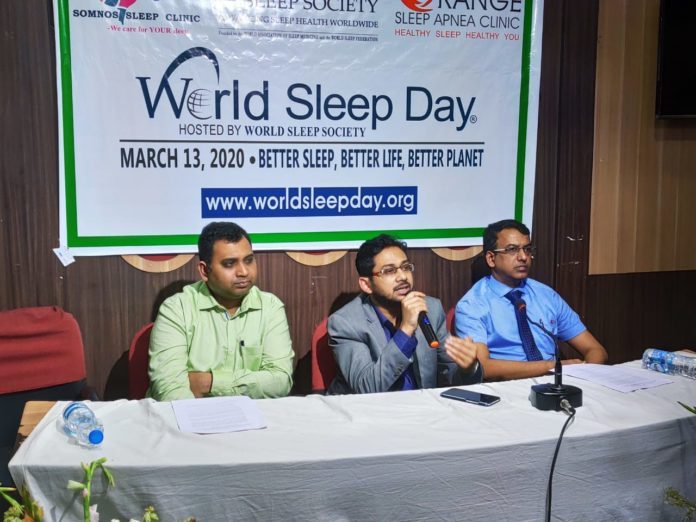Kolkata:
SOMNOS SLEEP CLINIC, KOLKATA in association with ORANGE SLEEP APNEA CLINIC & WORLD SLEEP SOCIETY.
• World Sleep Day 2020 will incorporate the slogan, ‘Better Sleep, Better Life, Better Planet,’ highlighting sleep’s important place as a pillar of health, allowing for better decision making and cognitive understanding in even big issues, such as our planet. This focus is purposefully broad in meaning, surrounding the message that quality of life can be improved with healthy sleep. Conversely, when sleep fails, health declines, decreasing quality of life. Sound sleep is a treasured function. World Sleep Society has compiled ten tips for healthier sleep. These recommendations for children and adults can be viewed on worldsleepday.org under resources.
• A man spends one third of his life sleeping. Yet, strangely, sleep is mostly neglected in our everyday lives. When we are young, we study and work sacrificing our sleep at the slightest pretext, often curtailing sleep for that extra hour of work/ studies. When we grow old, we try to fall asleep at any cost and use and abuse sedatives in the process.
• Sound sleep is a treasured function and one of the core pillars of health. When sleep fails, health declines, decreasing quality of life. Sleep and energy balance are essential for health. During sleep, energy is conserved due to suspended activity, movement, and sensory responses, and is redirected to restore and replenish proteins and their assemblies into cellular structures. Sleep also serves the very important function of information processing and memory consolidation.
• Sleep problems constitute a global epidemic that threatens health and quality of life for up to 45% of the world’s population. Three elements of good quality sleep are:
• Duration: The length of sleep should be sufficient for the sleeper to be rested and alert the following day.
• Continuity: Sleep periods should be seamless without fragmentation.
• Depth: Sleep should be deep enough to be restorative.
• There are close to one hundred sleep disorders known to mankind and fortunately most of these are preventable or treatable. The most common ones are insomnia, obstructive sleep apnea and restless leg syndrome.
• In India, the prevalence of obstructive sleep apnea is 13.7%. OSA is an independent risk factor for hypertension and other cardiovascular ailments and untreated sleep apnea may lead to heart diseases, stroke, diabetes, obesity, impotence and vascular dementia. In children, sleep apnea may be the underlying cause of neuropsychological disturbances.
• Both adults and children should be formally investigated in sleep centres if sleep apnea is suspected, because both adult and pediatric sleep apnea is treatable and correctable; a correct and precise diagnosis is always required.
• Sleep apnea is diagnosed with level 1 fully attended polysomnography in the sleep laboratory consisting of atleast 7 EEG, 2 EMG leads apart from the others leads like airflow, ECG, oximetry etc. It is very important to get the study data manually scored by a certified sleep specialist or sleep technician for correct interpretation of results which paves the way for correct diagnosis and treatment. Portable home sleep studies miss out on EEG leads or have only 1-2 EEG leads which make recognizing the various sleep wake stages inaccurate and difficult. Computerised/ automatic scoring can’t recognize the EEG waves correctly and hence often lead to inappropriate results and thus faulty diagnosis.
• Treatment with non-invasive positive airway (continuous positive airway pressure, or CPAP) ventilation is generally successful. Surgery to remove excessive tissues in the oropharynx may be considered for individuals who cannot tolerate non-invasive equipment or who have obvious obstruction to airflow in the oropharynx by redundant tissue growth or large tonsils, and is particularly helpful for children with OSA. There is proof that successful correction of sleep apnea with non-invasive positive airway pressure ventilation lowers mean blood pressure and may reduce the risk of myocardial infarction and stroke. Excessive daytime somnolence generally improves with successful treatment of sleep apnea.
• Insomnia affects around 35-40% of the general adult population. Lack of sleep or poor quality sleep also leaves us more vulnerable to accidents causing death or serious injury. Those with insomnia suffer from more symptoms of anxiety and depression and can affect work performance and have a general negative impact in all areas life including reduced job prospects and loss of employment.
• Restless Legs Syndrome is a common disorder and occurs in between 3-10% of the population, and is characterised by a vague and difficult-to-describe unpleasant sensation in the legs worse at rest and at night and relieved by movement or massage. If untreated, it impairs daytime functioning, productivity and can increase risk of depression, hypertension, kidney and heart diseases.
• PRINCIPLES OF GOOD SLEEP
Following the guidelines of Sleep Hygiene can help to prevent poor quality nocturnal sleep,
short duration of sleep, fragmentation of sleep and serious sleep deprivation in adults.
10 COMMANDMENTS OF SLEEP HYGIENE FOR ADULTS
- Fix a bedtime and an awakening time.
- If you are in the habit of taking siestas, do not exceed 45 minutes of daytime sleep.
- Avoid excessive alcohol ingestion 4 hours before bedtime and do not smoke.
- Avoid caffeine 6 hours before bedtime. This includes coffee, tea and many sodas, as well as chocolate.
- Avoid heavy, spicy, or sugary foods 4 hours before bedtime. A light snack before bed is acceptable.
- Exercise regularly, but not right before bed.
- Use comfortable bedding.
- Find a comfortable temperature setting for sleeping and keep the room well ventilated.
- Block out all distracting noise and eliminate as much light as possible.
- Reserve the bed for sleep and sex. Don’t use the bed as an office, workroom or recreation room.
10 COMMANDMENTS OF SLEEP HYGIENCE FOR CHILDREN [AGES BIRTH TO 12 YEARS] - Go to bed at the same time every night, preferably before 9:00PM.
- Have an age-appropriate nap schedule.
- 3. Establish a consistent bedtime routine.
- Make your child’s bedroom sleep conducive – cool, dark, and quiet.
- Encourage your child to fall asleep independently.
- Avoid bright light at bedtime and during the night, and increase light exposure in the morning.
- Avoid heavy meals and vigorous exercise close to bedtime.
- Keep all electronics, including televisions, computers, and cell phones, out of the bedroom and limit the use of electronics before bedtime.
- Avoid caffeine, including many sodas, coffee, and teas (as well as iced tea).
Keep a regular daily schedule, including consistent mealtimes.
Regional Coordinator (Eastern India) for World Sleep Day 2020, World
Experts Speak:
Dr. Sourav Das,
MBBS, MD, DNB, CCAM, IBSM. International Specialist Certification in Sleep Medicine (World Sleep Federation) Consultant Psychiatrist & Sleep Medicine Specialist
Dr. Sourav Das, MD, DNB, CCAM, IBSM (Somnos Sleep Clinic):
Dr. Uttam Agarwal, DLO, DNB, Fellowship in Sleep apnea surgery (Orange Sleep Apnea Clinic):
Sleep problems should not be underestimated in today’s world. Its understandable, we want to squeeze out the maximum productivity from a day, but it shouldn’t come at the cost of sleep, as it will lead to far fetched economic, social and health consequences, which will take away any extra benefits obtained by sleeping less. Any difficulty in initiating or maintaining sleep, any abnormal behavior while sleeping or any excessive daytime sleepiness should be promptly brought to the attention of the nearest qualified sleep specialist.
Till few years back obstructive sleep apnea had mainly one mode of treatment i.e PAP therapy. We have added another mode of treatment..multilevel sleep surgery. The patient is selected based on their sleep study and sleep endoscopy and of course history and clinical examination. The surgery usually involves one stage or 2 stage surgery involving nose, palate, tonsil, tongue epiglottis and mandible etc. These are the patients who have clinically favorable anatomy or looking for an alternative to PAP or are CPAP uncompiant patients. Results are very encouraging and promising.
Dr. Haseeb Hassan, MD, DM, IBSM (Dept. of Epileptology & Neurology, Rabindranath Tagore
Sleep is not only measure to rest one’s body, its mechanism to heal body. Sleep is important defense mechanism to fight illness and remain healthy. Proper quality and duration of sleep is important for optimal function, memory, mood and to keep check on blood pressure, sugar, cholesterol and other health hazards.
Simple measures like keeping the room temperature comfortable, taking care of noise and light, disciplined sleep timings, addressing medical problems and avoiding distracters (TV, Computer, Tea/ Coffee at night) help in most of cases. Taking sleeping pill casually can compound the problem. If these measures do not work, Sleep specialists should be consulted.
Remember, better sleep is must for better life.
Sleep Society International Institute of Cardiac Sciences)






















